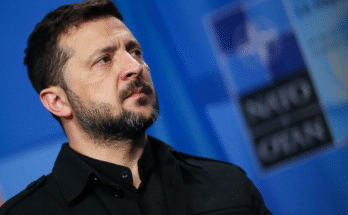LONDON — As a week-long conflict between Israel and Iran rages, European powers are making a last-ditch diplomatic effort to prevent the United States from joining the fray. The foreign ministers of Germany, France, and the UK, alongside EU High Representative Kaja Kallas, are heading to Geneva for emergency talks with Iranian officials on Friday. Their urgent goal: to dissuade Donald Trump from ordering a bombing raid on Iran’s nuclear facilities, a move Israel is actively encouraging.

A Narrow Window for Diplomacy
Despite the perceived weakness of European influence on the global stage, recent signals from the White House offer a glimmer of hope. On Thursday, Trump’s team announced he would decide on US military action within the next two weeks, citing a “substantial chance of negotiations.” This extended timeline opens a critical window for diplomatic engagement, giving Friday’s Geneva talks unexpected weight.
British Foreign Secretary David Lammy will fly directly to Geneva after meeting with his US counterpart, Marco Rubio, in Washington. He’ll join the foreign ministers of Germany and France, as well as the EU’s Kallas, to meet with Iranian Foreign Minister Abbas Araghchi. The central question remains: can the Europeans truly make a difference?
Europe’s Fading Influence
The current Iran crisis starkly highlights how Trump has eroded European geopolitical leverage over the past decade, even in areas where their interests align with America’s. Back in 2015, these same European nations—the E3—were instrumental in forging the Iran nuclear deal (JCPOA) under the Obama administration. However, Trump withdrew the US from the agreement in 2018, leaving Europe struggling to be heard on Iranian matters ever since.
Similarly, European powers have had little sway over Benjamin Netanyahu’s far-right government in Israel, particularly after the October 7, 2023 Hamas attacks.
Appealing to Trump’s Ambivalence
Privately, European officials hope to offer Trump a diplomatic off-ramp from his current trajectory toward military action. Trump has recently threatened to kill Iran’s Supreme Leader Ayatollah Ali Khamenei and is reportedly weighing the use of bunker-busting bombs to destroy Iran’s underground uranium enrichment plants.
“There is something that is holding Trump back,” an anonymous European diplomat noted, suggesting an opportunity exists because, despite his rhetoric, “nothing is happening.” The diplomat added, “We must not underestimate how much Trump hates war.”
John Sawers, former head of Britain’s MI6, believes Trump would have preferred Israel not to initiate direct conflict with Iran. “It was only a week ago that he was appealing to Israel to allow more time for his negotiations, but Netanyahu brushed that aside, and Trump has basically fallen in line with the Israeli approach.” Sawers suggests that since Israel has provoked Iran, it would be better for the US to intervene and “get it over with.”
Messaging America, Not Just Iran
However, other well-connected E3 officials and diplomats disagree, fearing direct US involvement would escalate the conflict into a full-scale regional war. The primary goal of resuming talks with Iran is to secure a guarantee that Tehran’s nuclear program will be used solely for civilian purposes, according to one E3 official. “That is exactly where we were with the negotiations… which have been thrown off track because of Israeli activity,” the official stated.
While a definitive conclusion from Friday’s talks is unlikely, particularly with French President Emmanuel Macron aiming to position himself as a “peacemaker,” the meeting is seen as a crucial communications exercise. “Any meeting will be to get a message from the Iranians to the Americans [about] their intentions regarding their nuclear program,” the official clarified.
Ultimately, the focus isn’t just on convincing Iran to de-escalate; it’s about influencing Trump. He has hinted at being close to fulfilling Netanyahu’s request to neutralize Iran’s nuclear capabilities, though he hasn’t yet endorsed calls for regime change in Tehran.
On Thursday, French Foreign Minister Jean-Noël Barrot stated that Iranians have been “relatively clear” in their willingness to resume talks, “including with the United States,” if a ceasefire is achieved. He emphasized Europe’s readiness to offer a formula that addresses the security interests of Israel, the region, and Europe, while simultaneously tackling Iran’s nuclear and ballistic missile programs, as well as its destabilizing regional activities.
Conflicting Agendas and Domestic Pressures
The European quest for peace directly clashes with Israel’s objective of convincing Trump to bomb Iran. An Israeli official outlined their expectations for European engagement: “We expect a clear and forceful message to the Iranians — dismantle nuclear program in totality, dismantle surface-to-surface missile capabilities and stop financing proxies and terror.”
Britain’s Lammy’s direct talks with Secretary of State Rubio in Washington are crucial for conveying Europe’s perspective to the heart of US decision-making. Rubio, serving as both top diplomat and acting national security adviser, holds significant sway, though it’s unclear if even his advice will be decisive for the President. The UK-US relationship is also complex, with Prime Minister Keir Starmer balancing his desire for closeness to the US (including potential military support) with his efforts to halt the conflict.
Adding another layer of complexity are Trump’s own domestic reasons for potentially avoiding war. While some traditional Republicans advocate intervention, others within his MAGA movement oppose foreign military ventures, seeing no reason to deploy American assets in this case. Trump also campaigned on promises to avoid new foreign wars and to be a peacemaker.
While the prospects for a diplomatic breakthrough in Geneva remain slim, a window for meaningful talks has now opened. It would be a significant irony if the European alliance, which Trump has actively sought to weaken, inadvertently aided the MAGA movement’s anti-war faction and provided him with an excuse not to bomb Iran.



